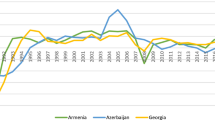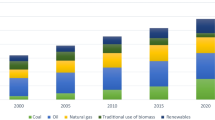Abstract
It is known that the transition to renewable energy can be a lever for the growth of both developed and developing countries. Thus, the whole world starts to become aware of the importance of the development of renewable energies, which became a priority for the future. In this context, Morocco belongs to the countries that set up some development policies for renewable energies in the short and medium term. Furthermore, this article investigates and analyzes the nexus and the relationship between renewable and non-renewable energy consumption, CO2 emissions, and economic growth for Morocco over the period going from 1990 to 2014 using the auto-regressive distributed lag model approach and the Granger causality test. The empirical results support that renewable energies in Morocco start to give their positive effects on the economic dimension of sustainable development and it is found that there is causality from renewable energy consumption to economic growth and from economic growth to CO2 emissions. However, the Moroccan government and private companies must look for innovative methods to finance renewable energy projects. In addition, these technologies can be the best substitute for fossil fuels: firstly, in order to reduce the burden of energy costs on the Moroccan economy (the energy bill in Morocco continues to rise, more than 100 billion DH in 2012); secondly, to strengthen its competitiveness without affecting the economic growth of the country.


Similar content being viewed by others
References
Adams S, Klobodu E, Apio A (2018) Energies renouvelables et non renouvelables, regime type and economic growth. RenewEnergy 125:755–767
AFDB (2019) Africain development bank group. https://www.afdb.org/sites/default/files/2019/10/15/crb_morocco_en.pdf
Alper A, Oguz O (2016) The role of renewable energy consumption in economic growth: evidence from asymmetric causality. Renew Sustain Energy Rev 60:953–959
Apergis N, Payne J (2010) Renewable energy consumption and growth in eurasia. Energy Econ 32:1392–1397
Apergis N, Payne JE (2011) The renewable energy consumption-growth nexus in central america. Appl Energy 88(1):343–347
Arib F (2014) Les services dans l’économie verte au maroc : opportunités de création d’emplois et défis d’innovation. http://www3.uah.es/iaes/sermed/Arib.pdf
Bank W (2019). http://data.worldbank.org/products/wdi
Bao C, Fang C (2013) Geographical and environmental perspectives for the sustainable development of renewable energy in urbanizing china. Renew Sust Energ Rev 27:464–474
Bao C, Xu M (2019) Cause and effect of renewable energy consumption on urbanization and economic growth in china’s provinces and regions. J Clean Prod 231:483–493
Bhattacharya M, Paramati S, Ozturk I, Bhattacharya S (2016) The effect of renewable energy consumption on economic growth: evidence from top 38 countries. Appl Energy 162:733–741
Broggio C, Cataia M, Droulers M, Velut S (2014) Transition énergétique : contexte, enjeux et possibilités. La revue électronique en sciences de l’environnement 3, https://www.erudit.org/en/journals/vertigo/2014-v14-n3-vertigo02337/1034936ar.pdf
Chen C, Pinar M, Stengos T (2020) Renewable energy consumption and economic growth nexus: evidence from a threshold model. Energy Policy 139:111295
Chen Y, Zhao J, Lai Z, Wang Z, Xia H (2019) Exploring the effects of economic growth, and renewable and non-renewable energy consumption on china’s co2 emissions: evidence from a regional panel analysis. Renew Energy 140:341–353
Cherni A, Jouini S (2017) An ARDL approach to the CO2 emissions, renewable energy and economic growth nexus: Tunisian evidence. Int J Hydrogen Energy 42:29056–29066
del RIOP, Burguillo M (2008) Assessing the impact of renewable energy deployment on local sustainability: towards a theoretical framework. Renew Sust Energ Rev 12(5):1325–1344
DeRichter RK, Ming T, Caillol S, Liu W (2016) Fighting global warming by ghg removal: destroying cfcs and hcfcs in solar-wind power plant hybrids producing renewable energy with no-intermittency. Int J Greenh Gas Con 49:449–472
Dincer I (2000) Renewable energy and sustainable development: a crucial review. Renew Sust Energ Rev 4(2):157–175
Dincer I, Rosen M (1999) Energy, environment and sustainable development. Appl Energy 64 (1):427–440
EIA (2019) Energy information administration. https://www.eia.gov
Exchange_Office (2019). https://www.oc.gov.ma/sites/default/files/2019-05/IEE%20Mars%202019.pdf
Fethi A (2017) The relationship amongst energy consumption (renewable and nonrenewable), 20 and GDP in Algeria. Renew Sust Energ Rev 76:62–71
Frimpong MJ, Oteng-Abayie E (2006) Bounds testing approach: an examination of foreign direct investment, trade, and growth relationships. American Journal of Applied Sciencess 4(1):257–270
HCP (2015) Haut-commissariat au plan. https://www.hcp.ma/file/174378/
Ibrahiem D (2015) Renewable electricity consumption, foreign direct investment and economic growth in egypt: an ARDL approach. Procedia Econ Financ 30:313–336
IEA (2019) Energy policies beyond iea countries: Morocco 2019. https://webstore.iea.org/download/direct/2736
IRENA (2017) Renewable energy and jobs: annual review 2017. http://www.irena.org/-/media/Files/IRENA/Agency/Publication/2017/May/IRENA_RE_Jobs_Annual_Review_2017.pdf
Ito K (2017) Co2 emissions, renewable and non-renewable energy consumption, and economic growth: evidence from panel data for developing countries. Int Econ 151:1–6
Kangyin D, Renjin S, Hongdian JZX (2018) CO2 emissions, economic growth, and the environmental Kuznetscurve in China:, What roles can nuclear energy and renewable energyplay?. J Clean Prod 196:51–63
Kardooni R, Yusoff S, Kari F, Moeenizadeh L (2018) Public opinion on renewable energy technologies and climate change in Peninsular Malaysia. Renew Energy 116:659–668
Koengkan M, Fuinhas J, Santiago R (2020) The relationship between co2 emissions, renewable and non-renewable energy consumption, economic growth, and urbanisation in the southern common market. J Environ Econ Policy 0(0):1–19
Le H, Bao H (2020) Renewable and nonrenewable energy consumption, government expenditure, institution quality, financial development, trade openness, and sustainable development in latin america and caribbean emerging market and developing economies. Int J Energy Econ Policy 10(1):242–248
Lin B, Moubarak M (2014) Renewable energy consumption - economic growth nexus for China. Renew Sustain Energy Rev 40:111–118
Luqman M, Ahmad N, Bakhsh K (2019) Nuclear energy, renewable energy and economic growth in pakistan: evidence from non-linear autoregressive distributed lag model. Renew Energy 139:1299–1309
Maji I, Sulaiman C, Abdul-Rahim A (2019) Renewable energy consumption and economic growth nexus: a fresh evidence from west africa. Energy Reports 5:384–392
MASEN (2011) Etude d’impact environnementale et sociale cadre du projet de complexe solaire d’ouarzazate. http://www.masen.ma/sites/default/files/documents_rapport/Masen_NOORo_FESIA_June_2014_7H3WhUg.pdf
Mathews A (2014) Renewable energy technologies: Panacea for world energy security and climate change? Procedia Comput Sci 32:731–737
Mbarek MB, Saidi K, Rahman M (2018) Renewable and non-renewable energy consumption, environmental degradation and economic growth in Tunisia. Qual Quant 52:1105–1119
MEME (2019) Ministry of energy, mines and environment. https://www.mem.gov.ma/Lists/Lst_Interviews/Attachments/5/InterInnovant.pdf
Midilli A, Dincer I, Ay M (2006) Green energy strategies for sustainable development. Energy Policy 34(18):3623–3633
Moreno B, Lopez A (2008) The effects of renewable energy on employment. The case of Asturias (Spain). Renew Sust Energ Rev 12(3):732–51
Ocal O, Aslan A (2013) Renewable energy consumption-economic growth nexus in Turkey. Renew Sust Energ Rev 28:494–503
Panwar N, Kaushik S, Kothari S (2011) Role of renewable energy sources in environmental protection: a review. Renew Sust Energ Rev 15(3):1513–1524
Paramati SR, Ummalla M, Apergis N (2016) The effect of foreign direct investment and stock market growth on clean energy use across a panel of emerging market economies. Energy Econ 56:29–41
Paramati SR, Apergis N, Ummalla M (2017) Financing clean energy projects through domestic and foreign capital: the role of political cooperation among the eu, the g20 and oecd countries. Energy Econ 61:62–71
Pesaran M, Shin Y, Smith R (2001) Bounds testing approaches to the analysis of level relationships. J Appl Econ 16:289–326
Rafindadi A, Ozturk I (2016) Effects of financial development, economic growth and trade on electricity consumption: evidence from post-Fukushima Japan. Renew Sust Energ Rev 54:1073–1084
Rahman M, Velayutham E (2020) Renewable and non-renewable energy consumption-economic growth nexus: new evidence from South Asia. Renew Energy 147:399–408
Razmi S, Bajgiran B, Behname M, Salari T, Razmi S (2020) The relationship of renewable energy consumption to stock market development and economic growth in iran. Renew Energy 145:2019–2024
RECAI (2016) Renewable energy country attractiveness index. https://www.ey.com/Publication/vwLUAssets/EY-RECAI-46-Feb-2016/%24FILE/EY-RECAI-46-Feb-2016.pdf
REN21 (2016) Report on the global status of renewable energy 2016. https://www.ren21.net/wp-content/uploads/2019/05/REN21_GSR2016_KeyFindings_fr_09.pdf
Sadorsky P (2009) Renewable energy consumption, co2 emissions and oil prices in the g7 countries. Energy Econ 31(3):456–462
Saidi K, Mbarek MB (2016) Nuclear energy, renewable energy, co2 emissions, and economic growth for nine developed countries: evidence from panel granger causality tests. Prog Nucl Energy 88:364–374
Salim R, Rafiq S (2012) Why do some emerging economies proactively accelerate the adoption of renewable energy. Energy Econ 34:1051–1058
Sims R (2004) Renewable energy: a response to climate change. Sol Energy 76(1):531–540
SNDD (2015) National sustainable development strategy 2015 - 2020 final report. http://rse.cgem.ma/upload/strategie-nationale-de-developpement-durable-2015-2020.pdf
Tugcu C, Ozturk I, Aslan A (2012) Renewable and non-renewable energy consumption and economic growth relationship revisited: evidence from g7 countries. Energy Econ 34(6):1942–50
Tuna G, Tuna VE (2019) The asymmetric causal relationship between renewable and non-renewable energy consumption and economic growth in the asean-5 countries. Resour Policy 62:114– 124
Ummalla M, Samal A (2019) The impact of natural gas and renewable energy consumption on co2 emissions and economic growth in two major emerging market economies. Environ Sci Pollut Res 26:20893–20907
Yo W, Hao (2020) An empirical research on the relationship amongst renewable energy consumption, economic growth and foreign direct investment in china. Renew Energy 146:598–609
Author information
Authors and Affiliations
Corresponding author
Ethics declarations
Conflict of interest
The authors declare that there are no conflicts of interest.
Additional information
Responsible Editor: Nicholas Apergis
Author contributions
Soufiane Bouyghrissi: Original draft preparation, methodology, software.
Abdelmoumen Berjaoui : supervision and reviewing.
Maha Khanniba : methodology , software, and writing.
Data availability
The data of our study is obtained from the World Bank (Bank 2019) and the Energy Information Administration (EIA 2019).
Publisher’s note
Springer Nature remains neutral with regard to jurisdictional claims in published maps and institutional affiliations.
Rights and permissions
About this article
Cite this article
Bouyghrissi, S., Berjaoui, A. & Khanniba, M. The nexus between renewable energy consumption and economic growth in Morocco. Environ Sci Pollut Res 28, 5693–5703 (2021). https://doi.org/10.1007/s11356-020-10773-5
Received:
Accepted:
Published:
Issue Date:
DOI: https://doi.org/10.1007/s11356-020-10773-5




